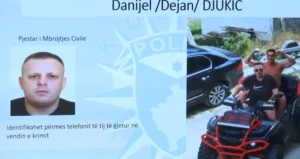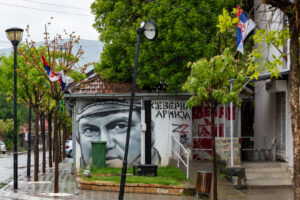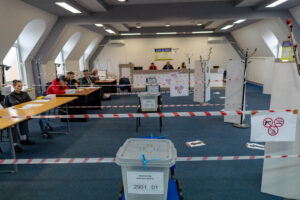In an evocative 2022 interview with KosovaPress, Aleksandar Arsenijevic, the formidable leader of the Civic Initiative ‘Serbian Survival’ turned political party ‘Srpska Demokratija’, fiercely criticised the notion that Russia’s aggressive tactics in Ukraine could destabilise the Balkans. Arsenijevic, a chemistry professor pushed from academia due to his bold political expressions, boldly declared Russian President Vladimir Putin powerless in influencing Serbia, quipping that Putin couldn’t “send two litres of fuel to Serbia.” Despite his disillusionment with Russian sway in the region, he voiced deep concern over the conflict in Ukraine, which he labelled “the most destructive event of the 21st century and a blight on modern civilisation,” reflecting on its grave implications for Balkan stability.
Moreover, Arsenijevic did not shy away from critiquing Serbian leadership, openly accusing President Aleksandar Vucic of deceiving Kosovo Serbs, a community often caught in a maelstrom of political instability and divided loyalties. Born in Pristina in 1992 and residing in northern Mitrovica and Zvecan, Arsenijevic, a distinguished chemistry master and current law student, has transitioned from academia and hospitality to a more confrontational role in regional politics. His journey from president of the Student Parliament at the Faculty of Natural Sciences to the inaugural head of ‘Srpska Demokratija‘ underscores his significant trajectory in advocating for Serbian endurance in the Balkans.
However, a recent investigation by The Frontliner Magazine in the Mitrovica region, a contentious area straddling the border with Serbia, paints a more complex portrait of Arsenijevic. Locally known by the moniker “Aco Ludi” (“Aco the Madman”), Arsenijevic elicits mixed reactions among the northern Kosovar-Serb residents. When probed about the nickname, responses ranged from nervous laughter to sombre descriptions, indicating a divisive figure in local politics. Further adding to his complex public persona, Arsenijevic also goes by “Aco_Sfens” on social media platforms.

These revelations point to a man who is as enigmatic as he is outspoken, living in a region where geopolitical tensions frequently mirror the complexities of its leaders.
Ahead of an April referendum on whether local Serbs support removing the current ethnic Albanian mayors to hold new local elections, I visited Mitrovica, a city in northern Kosovo, to gauge the mood. During my walk through the city, I stumbled upon the “Sfens Caffe Pub”, situated near the Faculty of Technical and Natural Sciences. Curious about its ownership, I asked around, but the answers were elusive; locals quietly muttered names like “Dejan” and “Aco”, while others quickly shushed them.

The web of intrigue deepens around Aleksandar Arsenijevic, a prominent critic of Kosovar authorities, as investigative efforts reveal layered connections within the local Serbian community. Arsenijevic, known locally as ‘Aco Ludi’ is linked to Sfens Caffe Pub, according to both national and international sources; multiple local residents have also confirmed this. Even Aco’s user account on ‘x‘ as “Aco_Sfens” suggests a connection with the establishment, which is reported to be currently or formerly managed by him. We gave Mr. Arsenijevic an opportunity to have his say, but he declined to respond. Our findings suggests that the actual owner is Danijel (Dejan) Djukic, a man that is entangled in a broader narrative of regional instability. Djukic, a fugitive, is implicated in the September 2023 Banjska Attacks orchestrated by Milan Radoicic of the Srpska Lista party, which positions itself as a voice for a Serbian minority. This connection complicates Arsenijevic’s repeated depictions on social media of Kosovo’s governance as repressive. Further complicating matters, Kosovar police have identified Djukic as a member of the “Civil Defense” organisation, deemed a terrorist entity by the government, linking him to the attack through evidence found at the scene. Djukic, also wanted for drug trafficking alongside his brother, has appeared in photographs with the son of Serbian President Aleksandar Vucic, intertwining political and criminal narratives in the troubled region.
Radoicic, along with other prominent figures from Srpska Lista, has been frequently seen with Serbian President Aleksandar Vucic at national security council meetings in Belgrade. The government in Pristina has accused Serbia of training, funding, and orchestrating the Banjska Attacks, suggesting a parallel with Russia’s annexation of Crimea. It appears that Radoicic now enjoys what could be described as a consequence-free haven in Serbia.
In my investigation of Aleksandar Arsenijevic, a figure gaining prominence in Kosovo and through Belgrade-supported media, I’ve critically assessed his claims of representing Kosovar Serbs. Arsenijevic has been noted for orchestrating incidents designed to provoke the Kosovar police into arresting him—a tactic he leverages for political gain. In another video he posted on his ‘X’ account, Arsenijevic referred to the Kosovar police as “armed men.” This terminology appears to be a strategic choice, aimed at subtly undermining the legitimacy of Kosovo’s police force, aligning with his broader political narrative.
His rhetoric mirrors the Serbian narrative from the late 1980s, espoused by Slobodan Milosevic’s allies, that Serbs are unsafe under non-Serb rule, a stance that incited devastating wars marked by egregious war crimes, including genocide in Bosnia and Herzegovina, as confirmed by the International Courts of Justice. Observing the similarities in Arsenijevic’s narrative, where he positions himself as a democrat while chairing “Srpska Demokratija,” I find it imperative to bring public attention to his activities.

Photograph by: Vudi Xhymshiti, for The Frontliner Magazine, via VX Pictures.
For instance, on the eve of the referendum, he made a statement to a Serbian-speaking TV channel, asserting:
“The situation is alarmingly bad. Will they seize our hosts’ land next and build bases in the North? They are already doing that. Will they arrest and beat people in the North? That’s already happening. Will they implement institutional repression and violence against Serbs? Well, that’s already happening. Will the decision on the dinar be revoked if the referendum goes ahead? No, it won’t,” said Aleksandar Arsenijevic, president of Srpska Demokratija.
Findings suggest that Arsenijevic is not just a controversial figure; he appears to be a key component in a broader agenda driven by Kremlin-aligned Serbian operations. Alarmingly, Aleksandar Arsenijevic has managed to secure a selfie with some notable US and German diplomats. His ambiguous stance on Kosovo’s democratic legitimacy raises serious concerns about his true loyalties. Is he genuinely advocating for his people, or is he merely another pawn in Russia-aligned Serbia’s ongoing denial of Kosovo’s sovereignty?
In May 2023, months after Belgrade’s decision to align its foreign policy with Moscow, Aleksandar Arsenijevic, commonly referred to as ‘Aco Ludi’, was reportedly “among those helping in orchestrating an armed assault on NATO peacekeeping forces.” This violent incident led to significant injuries, with at least 30 peacekeepers severely wounded and some requiring amputations due to the gunfire. According to national and international intelligence sources who expressed their concerns to The Frontliner Magazine, Aco’s name is whispered as one of those allegedly involved in orchestrations of targeting both Kosovar law enforcement and KFOR personnel. Although The Frontliner Magazine could not independently verify those claims, we have discovered several images on social media that show Arsenijevic himself, confirming his presence during those disturbances.
Arsenijevic has consistently refrained from condemning Belgrade’s aggressive actions against Kosovo’s territorial and constitutional integrity. His silence on the abductions of Kosovar police by Serbian forces and his failure to reject Serbia’s constitutional claims over Kosovo are telling. He also has not spoken out against the Russian-style annexation attempts of Kosovo’s northern territories or the anti-constitutional, militant activities of Serpska Lista, including their role in the Banjska attacks
Adding to the intrigue, evidence seen by The Frontliner Magazine with a photograph showing Arsenijevic alongside Marjan Radojevic, Blagoje Spasojevic, and Nemanja Stankovic, all implicated in the Banjska attacks. In the photo, Radojevic is first on the left, Arsenijevic himself second, Spasojevic third, and Stankovic far right. Notably, the last two are under arrest while Radojevic remains at large, wanted by Kosovar authorities on terrorism charges. This evidence suggests Mr. Arsenijevic’s alleged involvement in heinous activities that align with his and Belgrade’s political narrative and ambitions in Kosovo.

Photograph by: Vudi Xhymshiti, for The Frontliner Magazine, via VX Pictures.
After discovering this evidence, I texted Arsenijevic to request his email for an official inquiry. He read my message but did not respond. A follow-up text was sent to him four days later on April 22, offering him another opportunity to address these serious allegations. Arsenijevic has chosen to remain silent, deepening the questions about his activities and associations.
His actions and inactions underscore his role in a narrative that portrays Serbs as victims and Kosovo as an aggressor—a revival of Milosevic’s deadly propaganda aimed at justifying brutal acts against non-Serb populations in the Balkans. Given these insights, it is essential to recognise Arsenijevic as a substantial national security threat—a wolf in sheep’s clothing, cloaking his harmful intentions under a guise of victimhood.
As the curtain pulls back on Aleksandar Arsenijevic’s covert dealings, the international community and Kosovo’s law enforcement are faced with crucial decisions. Arsenijevic’s facade of democracy thinly veils his involvement in destabilising manoeuvres, raising an urgent question: How long will such duplicitous actors be allowed to undermine Kosovo’s sovereignty under the guise of political advocacy? It is critical that both global and local authorities intensify scrutiny and take decisive action against these threats to democratic integrity. Neutrality in the face of such deceptive tactics only serves to embolden those who seek to manipulate the political landscape for their own gains, risking the very foundations of peace and democracy in Kosovo.
NOTE from the Fact-checking Editor:
We would like to inform the reader that some of the evidence supporting our conclusive findings can be found on Mr. Arsenijevic’s social media accounts, which we linked to our words in this article. After analysing, we believe to the best of our abilities that it is related to what our findings suggest. We do not take any responsibility if Mr. Arsenijevic chooses to delete the evidence we referred to after reviewing it.
Vudi Xhymshiti, founder and chief editor of The Frontliner Magazine, brings a wealth of experience in reporting on global armed conflicts and political issues. With a background in Documentary Photography and Photojournalism from the University of the Arts London, and studies in Political Science, International Relations, and Diplomacy, Vudi skilfully merges human rights insights with dedicated journalism. His ethical and thoughtful reporting has graced top publications like The Guardian and The New York Times. At The Frontliner, launched in 2023, he explores the profound effects of conflicts on law, human rights, and freedoms, continuing his commitment to impactful storytelling.


